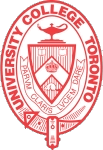University College, Toronto
 |
|
| Motto | Parum claris lucem dare (Latin) |
|---|---|
|
Motto in English
|
To shed light on that which is obscure |
| Type | Constituent college of the University of Toronto |
| Established | April 22, 1853 |
| Principal | Donald Ainslie |
| Undergraduates | 3,629 |
| Location | Toronto, Ontario, Canada |
| Campus | Urban |
| Website | |
| Official name | University College National Historic Site of Canada |
| Designated | 1968 |
Coordinates: 43°39′44″N 79°23′45″W / 43.66222°N 79.39583°W
University College is a constituent college of the University of Toronto, created in 1853 specifically as an institution of higher learning free of religious affiliation. It was the founding member of the university's modern collegiate system, and its non-denominationalism contrasted with contemporary colleges such as Trinity College and St. Michael's College, both of which later became part of the University of Toronto.
University College is one of two places in the University of Toronto that has been designated a National Historic Site of Canada, along with Annesley Hall of Victoria College. It is home to the oldest student government in Canada, the Literary and Athletic Society.
Shortly after taking power in the first responsible government of the Province of Canada, Reformist politicians led by Robert Baldwin wrested control of King's College from the Church of England in 1849 and renamed it the University of Toronto. Baldwin envisioned that denominational colleges would soon decide to affiliate themselves under the secular University of Toronto "with some vague status, perhaps as divinity halls". His hopes were dashed when the Presbyterian Queen's College in Kingston opted to stay independent. Baldwin resigned as premier in 1851, leaving his successor, Francis Hincks, to find another way to persuade the denominational colleges. Hincks decided that the university should adopt the collegiate university governance model, used for centuries at Oxbridge and more recently at the University of London.
...
Wikipedia
